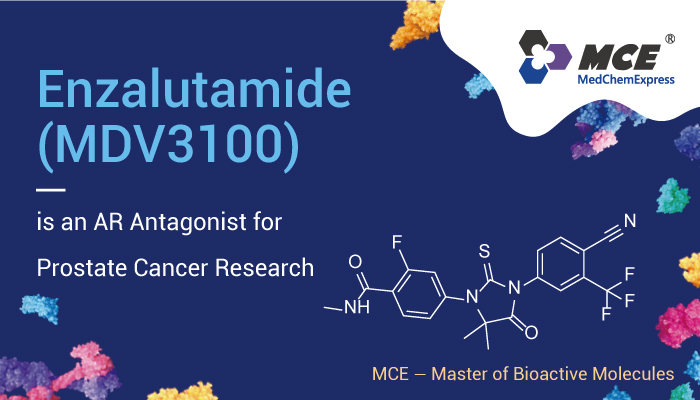The androgen receptor (AR) is a nuclear receptor, which can mediate the cellular action of androgen (male steroid). Besides, it can act as a transcription factor and regulate the development and growth of the prostate. When AR binds to ligands, it recombines with DNA at the androgen-responsive element in the target gene promoter region. Moreover, testosterone and dihydrotestosterone (DHT) are physiological ligands of AR. DHT is the main ligand for AR in prostate tissue. The transcriptional regulatory effects of AR include pathways involved in cell growth and proliferation, cell cycle progression, protein synthesis, and cell death.
Furthermore, the induction of AR activity is regulated by hormones, including dihydrotestosterone (DHT). Meanwhile, it enhances co-activators (p300 and SRC) and reduces the association between co-inhibitory proteins (NCoR, histone deacetylase [HDAC], and Smad) and AR. Nonetheless, AR is the main target of endocrine therapy for prostate cancer (PCa), and inhibiting AR signaling has significant benefits for PCa patients. The abnormal function of the androgen receptor (AR) is related to the pathogenesis and progression of human prostate cancer. Importantly, AR is still indispensable for the proliferation of prostate cancer cells that have become castrated resistant. Here, we will introduce an androgen receptor (AR) antagonist, Enzalutamide.
Enzalutamide (MDV3100) is an AR Antagonist for Prostate Cancer Research.
Above all, Enzalutamide (MDV3100) is an AR antagonist with an IC50 of 36 nM in LNCaP prostate cells. Particularly, Enzalutamide is an autophagy activator.
Next in importance, Enzalutamide has a greater affinity to AR than ICI 176334 does in a competition assay with 16β-[18F]fluoro-5α-DHT (18-FDHT) in castration-resistant LNCaP/AR cells (AR-overexpressing). While Enzalutamide shows no agonism in LNCaP/AR prostate cells. Enzalutamide antagonizes the induction of prostate-specific antigen (PSA) and transmembrane serine protease 2 (TMPRSS2), combined with the synthetic androgen R1881 in parental LNCaP cells. Obviously, Enzalutamide inhibits the transcriptional activity of a mutant AR protein (W741C, mutation of Trp741 to Cys). Interestingly, Enzalutamide also prevents nuclear translocation and co-activator recruitment of the ligand-receptor complex.
Once again, Enzalutamide (MDV3100) induces great tumor regression in castrate male mice bearing LNCaP/AR xenografts at a dose of 10 mg/kg. Additionally, Enzalutamide shows dose-independent pharmacokinetics at intravenous and oral doses of 0.5-5 mg/kg.
All in all, Enzalutamide (MDV3100) is an AR antagonist for prostate cancer research.
References:
Tran C, et al. Science, 2009, 324 (5928), 787-790.
Kim TH, et al. Arch Pharm Res. 2015 Nov;38(11):2076-82.